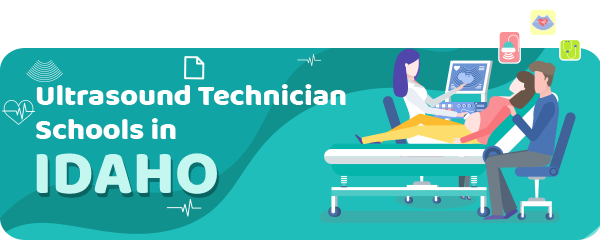
Maybe you want to pursue an ultrasound tech career in Idaho.
In that case, you should know job prospects in the industry are expected to see a growth of 25% until 2024.
Let’s have a look at the requirements needed to start your new career.
Article Table of Contents
Training Criteria
To work in the field in Idaho, you don’t need a certification or license, but holding one can increase your chances of finding employment.
These are managed by the American Registry of Diagnostic Medical Sonographers and issued only after taking an exam.
While certification will take one or 2 years to finish if you want to get a bachelor’s or associate degree you need to study between 2 and 4 years.
There are few school options in Idaho, but you should choose one that is approved by the Commission on Accreditation of Allied Health.
You will also need an average of 1500 hours of practical experience.
The mandatory classes you have to take are:
- Sonographic Physics
- Vascular Sonography
- Advanced Pathology
- Obstetrical Sonography
You can further choose to pursue a specialization, which will result in better job opportunities and a higher salary.
Annual Salary Range:| Location | Avg. Annual Salary |
|---|---|
| Boise | $72,457 |
| Meridian | $72,381 |
| Nampa | $71,693 |
| Idaho Falls | $69,421 |
| Caldwell | $71,617 |
| Pocatello | $66,363 |
| Coeur d'Alene | $75,145 |
| Twin Falls | $66,134 |
| Post Falls | $75,308 |
| Lewiston | $75,397 |
Regional Salary in Idaho
| Region | Employed | Avg. Annual Salary | Avg. Hourly Pay | Top 10% Annual Salary | Bottom 10% Annual Salary |
|---|---|---|---|---|---|
| Boise City, ID | 220 | $83,210 | $40 | $100,640 | $57,300 |
| Idaho Falls, ID | 40 | $81,180 | $39.03 | $93,820 | $49,590 |
* Employment conditions in your area may vary.
Sonography Training Courses
These teach how to use imagery and devices to provide diagnostics.
The topics covered in class are:
- Procedures of Ultrasound Imagery
- Principles of Ultrasound Imagery
- Ultrasound Physics
- Peripheral Vascular Sonography
MRI Tech Training Courses
MRI techs learn how to use high-definition images for diagnostics.
The subjects cover:
- Medical Terminology
- Healthcare Systems
- Clinical MRI Procedures
- Patient Care and MRI Safety
Vascular Sonography Courses
This specialization deals with blood vessels, and the class topics cover:
- Introduction to Patient Care
- Medical Imaging Procedures
- Anatomy and Physiology
- Vascular Clinical Experience
Radiology Tech Training Courses
The specialty covers internal body structure imagery.
The classes include:
- Radiographic Imaging Equipment
- Radiographic Procedures
- Clinical Radiologic Technology
- Immediate Radiographic Procedures
Echo Tech Training Courses
The specialty deals with creating non-invasive images of the cardiovascular system.
The classes cover topics such as:
- Electrophysiology
- Hemodynamics and Cardiac Physiology
- Drug Calculations and Administration
- Echocardiography Fundamentals
How to Get Certified in Idaho
In order to attend a program, you must finish physiology, anatomy, and medical terminology courses first.
The technician programs include both theory and practice which will help you get the experience needed to get hired.
To get a license, you also need to finish 60 semester hours, a required internship, and provide the needed paperwork for certification.
| School Name | Address |
|---|---|
| Boise State University | 1910 University Drive Boise, ID 83725-1845 |
| Idaho State University | 921 South 8th Avenue, Pocatello, Idaho, 83209 |
| Lewis-Clark State College | 500 8th Ave, Lewiston, Idaho 83501 |
You will then need to pass an exam that focuses on communication skills, safety, and record-keeping.
To get hired faster, consider becoming a member of The American Registry of Radiologic Technologists.
This new license will need to be renewed every 2 years, and 24 additional education credits are required for renewal.
Some of the schools in Idaho offer scholarships, which can be a good option to start your new career.
Read the full guide: How to Become an Ultrasound Technician